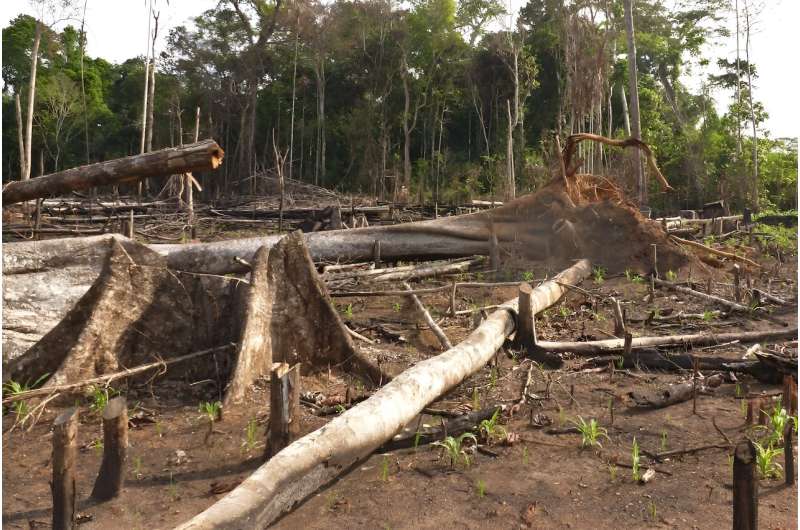This article has been reviewed according to Science X's editorial process and policies. Editors have highlighted the following attributes while ensuring the content's credibility:
fact-checked
peer-reviewed publication
trusted source
written by researcher(s)
proofread
'Worthless' forest carbon offsets risk exacerbating climate change

In early 2023, the Guardian published an article suggesting that more than 90% of rainforest carbon offsets are worthless. These credits are essentially a promise to protect forests and can be bought as a way to "offset" emissions elsewhere. Verra, the largest certifier of these offset credits, said the claims were "absolutely incorrect" but the story still shook confidence in the billion-dollar market. Soon after, Verra's CEO stood down.
The claims in the Guardian article rested heavily on analysis which had been published as a preprint (before peer review). Now the research has been fully peer-reviewed and is published in the journal Science. It shows unequivocally that many projects which have sold what are known as REDD+ (reducing emissions from deforestation and degradation) credits have failed to reduce deforestation.
REDD+ projects aim to slow deforestation (for example, by supporting farmers to change their practices). They quantify the carbon saved through reducing deforestation relative to what would have happened without the project, and sell these emission reductions as credits.
Such REDD+ credits are widely used to "offset" (that is, cancel out) emissions from companies (who may use them to make claims that their operations are carbon neutral) or by people concerned about their carbon footprint. For example, if you were planning to fly from London to New York you might consider buying REDD+ credits that promise to conserve rainforest in the Congo Basin (with added benefits for forest elephants and bonobos). Offsetting your return flight would appear to cost a very affordable £16.44.
However, while previous analysis showed that some REDD+ projects have contributed to slowing deforestation and forest degradation, the central finding from the new study is that many projects have slowed deforestation much less than they have claimed and, consequently, have promised greater carbon savings than they have delivered. So that guilt-free flight to New York probably isn't carbon neutral after all.
The finding that many REDD+ carbon credits have not delivered forest conservation is extremely worrying to anyone who cares about the future of tropical forests. We spoke to Sven Wunder, a forest economist and a co-author of the new study. He told us that, "To tackle climate change, tropical deforestation must be stopped. Forests also matter for other reasons: losing forests will result in loss of species, and will affect regional rainfall patterns. Despite the evidence that REDD+ has not been delivering additional conservation, we cannot afford to give up."

Deforestation could simply move elsewhere
Carbon credits also face other challenges, one of the biggest being "leakage" or displacement of deforestation. Leakage may occur because the people who were cutting down the forest simply relocate to a different area.
Alternatively, demand for food or timber that was fuelling deforestation in one place may be met by deforestation elsewhere—perhaps on the other side of the world. Another problem is ensuring that the forests are protected in perpetuity so that reduced deforestation represents permanent removal of carbon from the atmosphere.
Addressing these challenges is vital because selling carbon credits is an important source of finance for forest conservation. It is not too dramatic to say that unreliable REDD+ credits directly threaten forests.
However, this is an active research area and new approaches are increasingly available. Andrew Balmford is a professor of conservation science at the University of Cambridge who is actively developing methods to improve the credibility of forest carbon markets. He says the new study raises some important concerns but that more robust and transparent methods have been developed. Deploying these new methods, he told us, is "an urgent priority."
Change is also needed to how certification operates. At present, there are incentives for verifiers to inflate estimates of the amount of deforestation that would have happened without the project, and therefore the number of credits that can be issued. Sven Wunder explains: "We need to move beyond vested interest towards independent governance employing scientifically informed, cutting-edge methods."

Reasons to be cautious
Even if these problems can be solved, there are still reasons to be cautious about the role of carbon offsets in combating climate change. First, there is the risk that offsetting actually increases emissions because people or companies might feel more comfortable emitting carbon if they believe they can undo any damage by simply buying carbon credits.
For this reason, some argue that offsets must only ever be a last resort, after all non-essential emissions have been cut (the problem being of course: who decides which emissions are essential?).
Second, keeping warming within 2°C will require most deforestation to be stopped and major reductions in fossil fuel emissions. There is a limit to which one can be used to balance out the other.
Finally, there are serious equity concerns with some forest carbon offsets. If forest conservation is achieved by stopping farmers in low-income countries from clearing land for agriculture, REDD+ may exacerbate poverty: your long haul flight would come at the expense of others being able to feed their families.
We don't know how much it would cost to achieve genuinely additional offsets which avoid leakage and ensure equity but it is likely to be considerably more expensive than forest carbon credits currently sell for. A higher price would reduce the perception that offsetting is an easy option and should encourage more focus on reducing emissions.
So, should you buy those cheap forest carbon offsets when taking a flight? Unfortunately, there's currently little evidence that doing so will really make your journey carbon neutral. If you want to contribute to tackling climate change, perhaps the only real option is to not take the flight.
Journal information: Science
Provided by The Conversation
This article is republished from The Conversation under a Creative Commons license. Read the original article.![]()





















